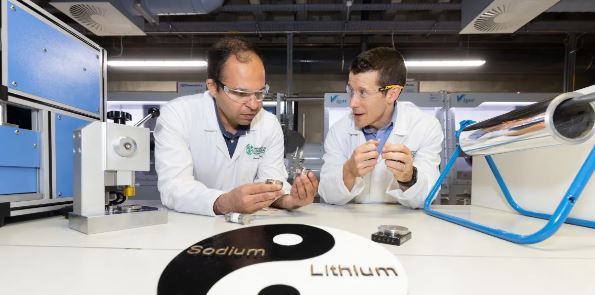Science
University of Limerick Unveils Revolutionary Dual-Cation Battery

Research at the University of Limerick has led to a significant advancement in battery technology, introducing the world’s first full-cell dual-cation battery. This innovative system combines lithium and sodium ions to enhance battery capacity and stability, potentially transforming the future of electric vehicles and portable electronics.
The breakthrough was spearheaded by Hugh Geaney, an Associate Professor in Chemistry at UL’s Department of Chemical Sciences and Principal Investigator at the Bernal Institute, along with postdoctoral fellow Dr. Syed Abdul Ahad. Their collaborative work with researchers from the University of Birmingham has been documented in the journal Nano Energy.
Dual-Cation System Enhances Performance
Unlike traditional sodium-only batteries, this dual-cation system utilizes both lithium and sodium, leveraging their strengths to improve performance while prioritizing sodium as the primary component. “For the first time, we’ve shown that sodium-ion batteries can be ‘supercharged’ by pairing sodium and lithium in a sodium-dominant dual-cation electrolyte,” stated Associate Professor Geaney.
This innovation allows lithium to serve as a “capacity booster,” significantly increasing the battery’s overall capacity. According to Dr. Abdul Ahad, the integration of both lithium and sodium cations effectively doubles the battery capacity compared to conventional sodium-ion batteries, which are generally restricted in performance.
Implications for Energy Storage and Sustainability
The design of this battery not only improves energy density—crucial for extending the range of electric vehicles—but also enhances safety and sustainability. By minimizing reliance on expensive and environmentally challenging materials, such as cobalt, this new technology presents a more viable alternative to traditional lithium-ion batteries.
Sodium-ion batteries have long been recognized for their potential as a sustainable alternative; however, they typically lack the energy density of lithium-ion variants, resulting in poorer battery performance. The new dual-cation battery addresses this limitation, allowing sodium ions to achieve high capacity while maintaining an operational lifespan of up to 1000 cycles.
The research received support from the Government of Ireland Postdoctoral Fellowship and the Research Ireland Frontiers for the Future programme. The team is now focused on expanding their study to explore additional material combinations and ion systems, including silicon-based anodes and alternative pairings like lithium-magnesium and potassium-lithium.
The Geaney Research Group is dedicated to pioneering advancements in energy storage solutions. With over 30 active researchers involved in UL’s battery cluster and the interdisciplinary AMPEiRE centre, the university continues to position itself at the forefront of next-generation energy technology.
This development marks a significant step not only for the University of Limerick but also for the broader landscape of sustainable energy research, potentially paving the way for more efficient and environmentally friendly energy storage solutions in the future.
-

 Top Stories1 month ago
Top Stories1 month agoTributes Surge for 9-Year-Old Leon Briody After Cancer Battle
-

 Entertainment3 months ago
Entertainment3 months agoAimee Osbourne Joins Family for Emotional Tribute to Ozzy
-

 Politics3 months ago
Politics3 months agoDanny Healy-Rae Considers Complaint After Altercation with Garda
-

 Top Stories2 months ago
Top Stories2 months agoIreland Enjoys Summer Heat as Hurricane Erin Approaches Atlantic
-

 World3 months ago
World3 months agoHawaii Commemorates 80 Years Since Hiroshima Bombing with Ceremony
-

 Top Stories3 months ago
Top Stories3 months agoFianna Fáil TDs Urgently Consider Maire Geoghegan-Quinn for Presidency
-

 World3 months ago
World3 months agoGaza Aid Distribution Tragedy: 20 Killed Amid Ongoing Violence
-

 World3 months ago
World3 months agoCouple Convicted of Murdering Two-Year-Old Grandson in Wales
-

 Top Stories1 month ago
Top Stories1 month agoNewcastle West Woman Patricia Foley Found Safe After Urgent Search
-

 Top Stories2 months ago
Top Stories2 months agoClimbing Errigal: A Must-Do Summer Adventure in Donegal
-

 Top Stories2 months ago
Top Stories2 months agoHike Donegal’s Errigal Mountain NOW for Unforgettable Summer Views
-

 World3 months ago
World3 months agoAristocrat Constance Marten and Partner Convicted of Infant Murder









